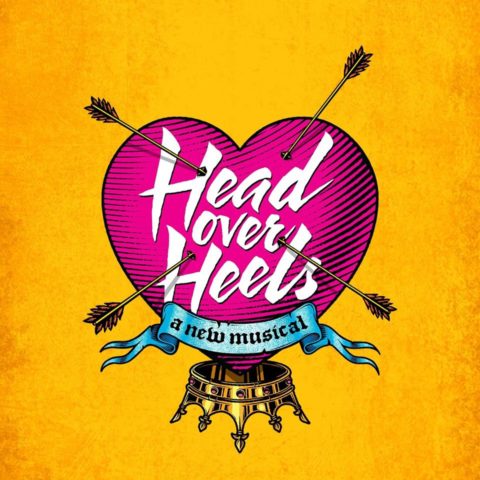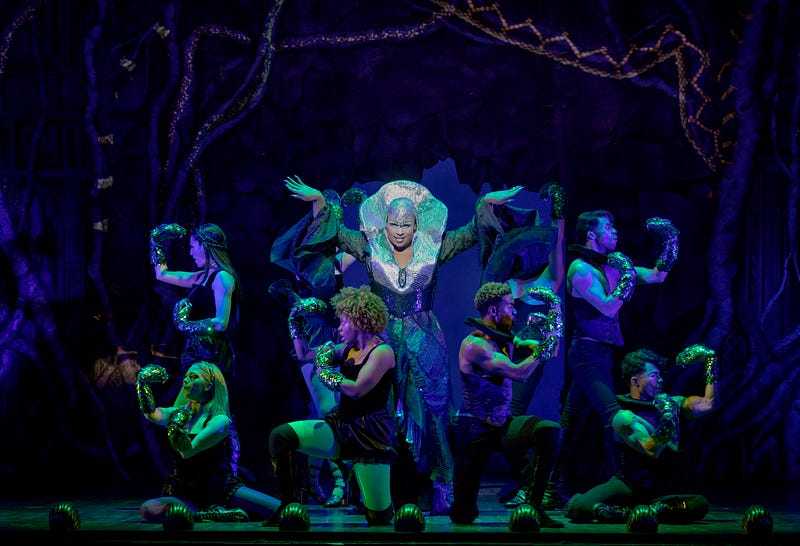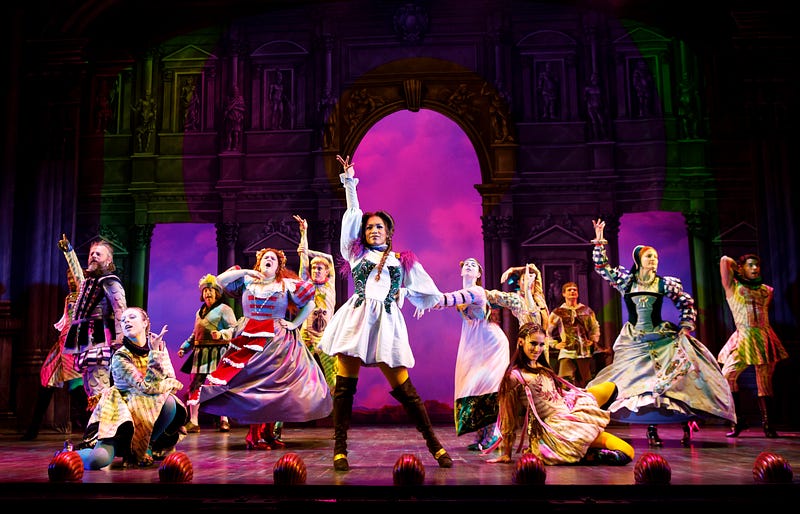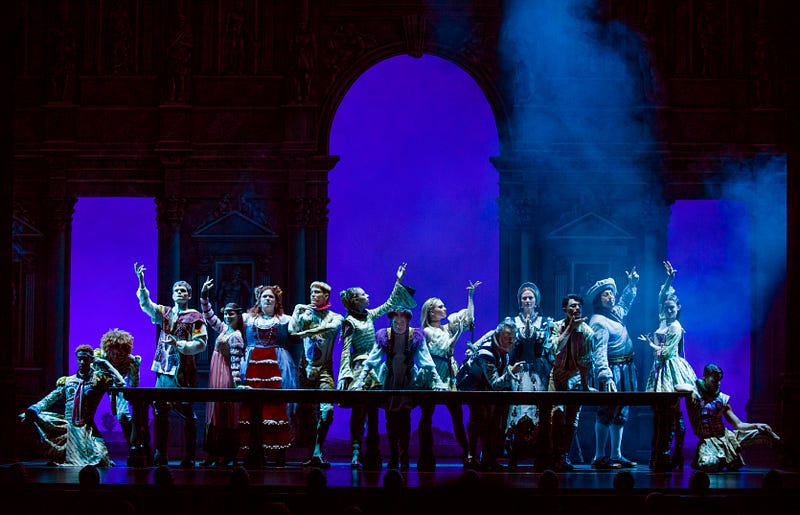 Uncompromisingly queer and endlessly effervescent, Broadway-bound musical Head Over Heels earned an extended standing ovation in its out-of-town debut at San Francisco’s Curran Theater last Wednesday night.
Uncompromisingly queer and endlessly effervescent, Broadway-bound musical Head Over Heels earned an extended standing ovation in its out-of-town debut at San Francisco’s Curran Theater last Wednesday night.
The show is an unlikely hybrid of the drum- and guitar-based early ’80s music of the Go-Go’s and a plot from Sir Philip Sidney’s 16th Century epic, The Arcadia.
The featured part of Pythio — A woman? A serpent? An oracle? — is played by Peppermint, season nine runner up on RuPaul’s Drag Race.
And, oh yeah, the dialogue is in verse.
Somehow, this odd lot of ingredients — enhanced by a generous dash of salty humor and a citric splash of social commentary — is transformed into a sweet, springy meringue of a show. The largely gay creative team, including director Michael Mayer, book writers Jeff Whitty and James Magruder, and choreographer Spencer Liff have cooked up something singularly ingenius.
Mayer, who worked with much of the same team on the 2014 revival of Hedwig and the Angry Inch has recently found himself peppered with questions as to whether Head Over Heels’ mix of pop-rooted music and historical text is nipping at the heels of Hamilton. It’s a sign of the extent to which Hamilton — while inspiringly opening theater to broader audiences — has largely monopolized mainstream American conversation about Broadway over the past three years.
“I’d point to Spring Awakening,” says Mayer, harkening back to his own groundbreaking 2006 Tony-winner. Based on German playwright’s Franz Wedekind’s 1891 drama of teen sexual repression and rebellion, that hit production, featured a perid-costumed cast — including Jonathan Groff and Lea Michele — singing a rock score by Duncan Sheik.
Mayer also directed and conceived — with Billie Joe Armstrong — the Green Day musical, American Idiot.
“But there are significant differences between all of these shows,” Mayer adds. “Spring Awakening had an original score written to work with an existing plot, American Idiot already had a story mapped out in the songs and Head Over Heels reimagines a text that’s centuries old and incorporates contemporary music.”
And, while as imaginative as those predecessors, Head Over Heels comes with a buoyant lightness and rib-tickling ribaldry thanks to Magruder’s verse, much of which derives from the “Old Man from Nantucket” school of poetry, and the enchanting Maxfield Parrish visuals created by scenic and lighting designers Julian Crouch and Kevin Adams.
“Head Over Heels is so hard to explain to someone who hasn’t seen it,” concedes choreographer Liff. “I mean, a cross between Elizabethan farce and the Go-Go’s? Its easy to understand how someone might think that wouldn’t work. But it works amazingly. It’s going to be a big word-of-mouth show.”

Indeed, on paper, Head Over Heels could confound today’s audiences as much as Peppermint confounded producers twenty years ago, when she first sought work on Broadway.
“Drag was really a detour for me,” says the statuesque stalwart of the Manhattan club scene, “I was auditioning for anything and everything in New York theater, but there wasn’t room for anyone with my gender expression.”
Now, nearly two decades after starting her climb to the top of the drag world, there is widespread cultural conversation about gender fluidity. And Peppermint aka Agnes Moore (and the one-time Kevin Moore), is starring in a piece that aims directly at the mainstream with a message that gender, gender-roles and sexuality are in flux within all of us.
Head Over Heels’ overarching plot is simple: To avoid an oracle’s prediction of calamity, a monarch and his subjects take a road trip. Their itinerary includes Lesbos and Bohemia. But along the way, every one of the characters juggles senses of self with notions of propriety: There’s a cocky king who falls for a lad in drag; that lad, who loves a lass, but kicks ass in a dress; a Sapphic servant whose missing mother proves something other; and so on-and-on in a giddy pretzel of mistaken identities and misplaced affections.
Even Spencer Liff’s choreography dispenses with gender roles, as the chorus — in costume designer Arianne Phillips’ exaggerated codpieces and unisex kilts printed with sheet music — spins into both same- and mixed-sex duos during celebratory, stage-filling numbers including the title song and “Mad About You” (Technically a Belinda Carlisle solo hit).
In addition to making the dancing relatively genderless, the openly gay Liff, 33, also wanted to make it somewhat timeless. Part of the freshness of his contribution comes from the fact that the Go-Go’s were not a part of his own adolescent musical canon.
“Now that I’ve been working with them, I love the songs. But at first, I mainly remembered them as something my Mom listened to. Beauty and the Beatcame out four years before I was born,” says Liff.
“I didn’t want to do anything particularly reminiscent of either court dancing from the 16th century or dance styles from the 1980s, when the Go-Go’s were popular. Instead, I pulled from clubs and queer culture; there’s some really intricate, percussive choreography that does draw on voguing and tutting, but its not how you would have seen those styles in the 1980s.”
(Tutting, ironically, is an almost anti-Go-Go’s dance form, having had its brief moment in the mainstream spotlight thanks to “Walk Like An Egyptian,” a hit by rival ’80s girlband, The Bangles).

Unlike Liff, orchestrator and arranger Tom Kitt — best known for his Tony-winning Next to Normal score — had a fond familiarity with the Go-Go’s before working on Head Over Heels.
“Michael Mayer approached me with this sometime in 2016 and I was excited from the start. I’ve idolized the Go-Go’s since I was eight or nine years old. I have older brothers and sisters, and in 1981, they were teenagers, so we were all watching MTV together. Seeing the Go-Go’s videos, I was just obsessed. I remember sitting on my bed, listening to the vinyl albums and reading along with the lyrics on the sleeve.”
“There’s always a challenge in taking songs that weren’t written for a musical and making them work with the book. And this story was written a few hundred years before the Go-Go’s!”
But Kitt had previously collaborated with Mayer on American Idiot, the Green Day musical, and wasn’t particularly daunted by potential lyrical incongruities. Where felt more challenged was in deepening the Go-Go’s highly percussive, post-punk sound for theatricality.
“Its important that the audience hears the tonality and the feel of the Go-Go’s, but I added layers of vocals and instrumentation to enrich what’s already there.”
“I also needed to identify themes that could be tied to characters and support the movement of the plot. There were some really infectious elements to work with: the piano line that introduces ‘Head Over Heels,’ that beautiful bridge in ‘Our Lips Are Sealed’[Hush my baby…], the build at the beginning of ‘Vacation’.”
Kitt also says that Go-Go’s Jane Wiedlin and Charlotte Caffey were generous in helping him tease out the nuances that make their sound so distinctive. “Charlotte would come show the guitarist just how she played a particular part. They’d explain exactly which cymbals were used in certain drum parts.”
“I can’t say enough about that collaboration,” he notes. “They are fantastic musicians. They gave me great notes, but they also gave me all the freedom I needed.”
There was also a freedom in knowing that — with the exception of die-hard Go-Go’s fans most audience members will only be familiar with — and have expectations of — a few songs.
Only three Go-Go’s singles — “Our Lips Are Sealed,” “We Got the Beat” and “Vacation” — ever made the top 20 on the U.S. Billboard charts (Compare that to the whopping 22 top 20 hits available to the creators of Jersey Boys). So its essential that the show be more than a nostalgia-driven hit delivery device.
“It’s not at all like Mamma Mia,” points out Tom Alan Robbins, the veteran Broadway actor who was The Lion King’s original Pumba and plays the king’s loyal viceroy in Head Over Heels. “Part of what audiences loved about that show was how cleverly the story was written so the songs could be shoehorned into the plot. You sat there figuring out the puzzle of what song was about to be sung next. Here, the story comes first.”
“Someone who didn’t know the Go-Go’s could come to Head Over Heels,” says Robbins, “and think the songs were written for the purpose of telling this story.”

Nonetheless, says director Mayer,“One of the most wonderful things I can imagine coming out of this show’s success would be a whole new generation discovering and getting to enjoy the music of the Go-Go’s.”
Kitt agrees, delighted by the possibility that some of the band’s lesser known songs will be given a second chance to shine. Among the deep cuts included in the musical are ‘Automatic Rainy Day’ (reframed as an explosion of repressed lesbian love) and ‘Vision of Nowness’ (a nugget of poppy Zen).
“There’s a beautiful song called ‘Here You Are’” says Kitt (from a non-charting 2001 reunion album, God Bless the Go-Go’s) “that I wrote choral parts for. The Go-Go’s have responded really warmly toward the new arrangement, and Jane’s even talked to me about the possibility of them performing it.”
For the Go-Go’s and the cast of characters that turns ‘Head Over Heels’ in re-examining their identities and attractions in the musical, second chances are the happy order of the day.
But perhaps the happiest second chance of all belongs to Broadway’s forthcoming forty-something ingénue.
“I could die tomorrow,” says Peppermint. ““This is everything I’ve ever wanted to do. I have loved musicals since I was in the womb. And it makes me so happy to be in such a fun show with that also has such a strong underlying theme about the quest for true equality, regardless of gender or sexual orientation.”
To explore further…
